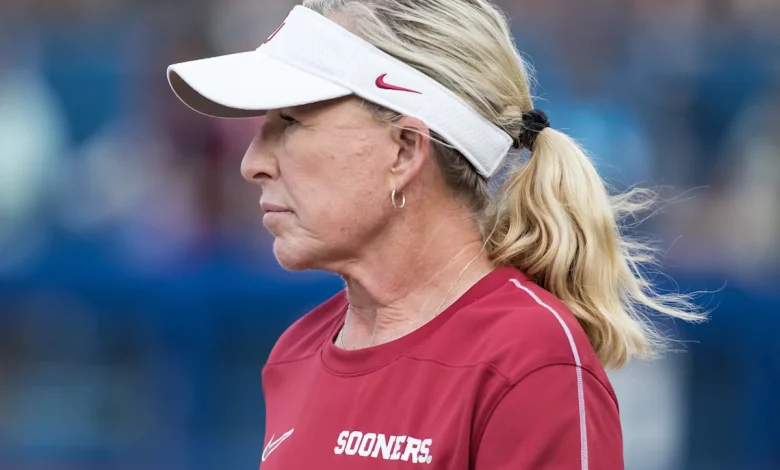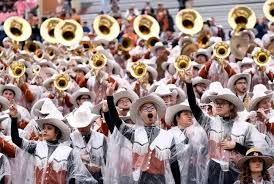OU Softball coach Patty Gasso urges NCAA to reconsider Women’s College World Series schedule, citing player fatigue and competitive fairness.

In college softball, few names carry as much weight as Patty Gasso. As the head coach of the Oklahoma Sooners, she has built one of the most dominant programs in NCAA history, winning numerous national championships and redefining the standard for success in the sport. But Gasso’s legacy goes beyond wins and trophies — she’s also become a fierce advocate for student-athlete welfare and the broader integrity of the game.
Recently, Gasso turned her attention to a growing concern that has echoed among coaches, players, and fans alike: the scheduling format of the Women’s College World Series. As the WCWS continues to grow in popularity and viewership, Gasso is calling on the NCAA to prioritize the health, safety, and fairness of the tournament by revising its outdated and demanding schedule format.
The Core of the Issue: A Grueling Schedule
The WCWS, held annually in Oklahoma City, features the final eight teams in the NCAA Division I Softball Championship competing in a double-elimination format, culminating in a best-of-three championship series. On the surface, it seems logical and exciting. In practice, however, the schedule is relentless — especially for teams that fall into the losers’ bracket.
In the current setup, teams may play multiple games in a single day with minimal rest in between. For example, it’s not uncommon for a team to finish a high-pressure night game around 10:30 PM, only to be scheduled again at 11:00 AM the next morning. Add in press responsibilities, team meetings, travel time, and the adrenaline crash, and players are left physically and mentally depleted.
This is what Patty Gasso has publicly criticized — not just for her own team, but on behalf of all athletes competing at the highest level of collegiate softball.
Gasso Speaks Out: “If We’re About Welfare, Then Prove It”
In a 2021 postgame press conference after her team was scheduled to play an early game the day after a late-night battle, Gasso didn’t mince words. “If we’re about the welfare of the student-athlete, that is what is being preached to all of us — then do something,” she said. “This is absolutely ridiculous.”
Her comments resonated across the softball community and were echoed by players and coaches alike. Gasso argued that such scheduling disadvantages teams who lose early and are forced into the losers’ bracket, often playing back-to-back elimination games in extreme heat and without rest.
Her frustration wasn’t just about fatigue — it was about fairness. The imbalance in rest disproportionately affects certain teams, making the tournament not only grueling but also competitively unequal.
The Contrast With the Men’s College World Series
One of the most frequently cited comparisons is between the WCWS and the Men’s College World Series (CWS), held in Omaha. The CWS features more built-in rest days, especially during critical phases of the tournament.
In the men’s event, no team is required to play more than one game per day. Rest and preparation are prioritized, not only out of respect for the athletes’ health but also to ensure the best possible product for fans and television. The women’s game, despite its growth and popularity, hasn’t received the same consideration — a fact that Gasso and others believe reflects a systemic inequity.
“There’s a clear discrepancy,” Gasso noted. “Our sport deserves the same treatment and consideration. These athletes have worked just as hard and sacrificed just as much.”
The Impact on Athletes
The consequences of this compressed schedule go beyond inconvenience. The physical toll includes dehydration, increased injury risk, mental fatigue, and burnout. Softball is a game of precision and reaction, and a fatigued body simply doesn’t perform the same.
Pitchers, in particular, face immense pressure. A pitcher might throw 100+ pitches in a high-stakes game, only to be called upon again the next day — or even the same day — to do it all over again. In baseball, this would be unheard of.
“It’s not just about one team being tired,” Gasso explained. “It’s about the overall quality of play. Fatigue leads to mistakes, and mistakes change games. We’re not giving these athletes the chance to compete at their best.”
A Growing Chorus of Support
Patty Gasso is far from alone in her advocacy. Coaches from across the country, including those at UCLA, Florida State, and Alabama, have spoken out in favor of WCWS reform. Players past and present have shared their stories of exhaustion, cramping, and emotional strain under the current system.
Fans, too, have noticed the difference. In 2021, social media lit up with complaints when top teams like Oklahoma and James Madison were forced into tight turnaround games, prompting questions about how the schedule was determined and who it ultimately serves.
Even sports analysts and broadcasters have joined the call for change. ESPN’s Holly Rowe, a longtime supporter of women’s sports, tweeted during the 2021 WCWS: “These athletes deserve better. They’ve earned rest. Let’s fix this.”
Small Progress: The 2022 Schedule Adjustment
In response to mounting pressure, the NCAA made a modest change in 2022, extending the WCWS from seven to nine days to allow for rest between games and eliminate doubleheaders in the losers’ bracket. It was a step in the right direction — and one Gasso acknowledged — but she stressed that more needed to be done.
“It’s better,” she said in 2022. “But it’s not quite there yet. We need a structure that treats our athletes like professionals and prioritizes fairness.”
The change provided much-needed breathing room, but it still didn’t bring the WCWS to parity with the men’s event in terms of scheduling consistency and fairness.
What Gasso Wants Changed
Patty Gasso’s proposed reforms are straightforward and actionable:
- Rest Days Between Elimination Rounds: Allow at least one day of rest between each round of play, particularly for teams facing elimination.
- Uniform Start Times: Prevent early-morning start times after late-night games to allow for adequate recovery and sleep.
- Equal Treatment Across Genders: Apply the same scheduling philosophy used in the Men’s College World Series to the WCWS.
- Player Input: Involve student-athletes in scheduling decisions, including feedback surveys post-tournament.
These changes wouldn’t just improve player welfare — they’d elevate the product on the field. Better-rested athletes mean higher quality games, better television ratings, and a more marketable sport overall.
The Broader Significance
Gasso’s campaign goes beyond just softball. It’s part of a broader push within the NCAA to treat women’s sports with equal care, investment, and respect. The disparity in scheduling mirrors other gender equity issues, such as differences in travel accommodations, tournament facilities, and media coverage.
As one of the most visible and successful coaches in women’s collegiate sports, Gasso understands her platform — and she’s using it.
“This isn’t just about Oklahoma,” she said. “It’s about the future of our sport. It’s about the next generation of girls who deserve to compete on equal footing.”
Looking Ahead: Will the NCAA Listen?
The ball is now in the NCAA’s court. With growing awareness and advocacy from top figures like Gasso, it becomes harder to ignore the call for fairness. The question isn’t whether the WCWS format can be changed — it’s whether the will exists to do it.
If the NCAA truly stands by its commitment to student-athlete welfare, then Patty Gasso’s message should be a catalyst for change. Creating a schedule that prioritizes health, fairness, and quality of competition is not just the right thing to do — it’s what the sport needs to continue growing.
Patty Gasso is more than a championship-winning coach — she’s a leader advocating for the long-term future of softball. Her demand that the NCAA rethink the WCWS schedule isn’t based on convenience or selfishness, but on a deep respect for the game and the young women who play it.
By pushing for a fairer, more sustainable tournament format, Gasso is laying the groundwork for future athletes to thrive. It’s a call to action, not just for softball but for all of women’s sports.









